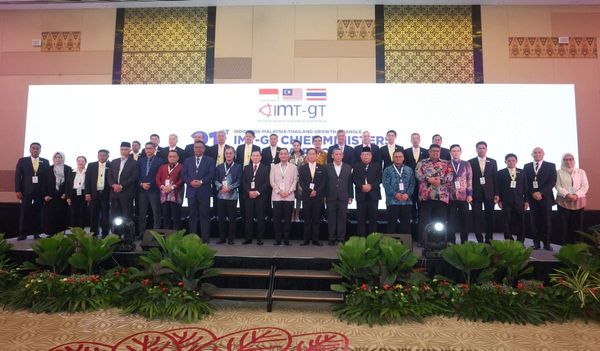KUALA LUMPUR, July 10 — Indonesia, Malaysia, and Thailand remain committed to advancing the integration of the Indonesia-Malaysia-Thailand Growth Triangle (IMT-GT) as a key strategy to mitigate the impacts of global uncertainties and strengthen regional stability and resilience.
Thailand’s Information Department director-general Nikorndej Balankura said the commitment was reaffirmed by several ministers during the 58th Asean Foreign Ministers’ Meeting (AMM). He emphasised the need for more active engagement in political, economic, and trade cooperation in light of ongoing geopolitical volatility.
“Global economic uncertainties and the pandemic have hampered the growth and the pace of the IMT-GT advancement, so it has been slowed down a bit.
“However, the IMT-GT continues to pursue sub-regional integration as a strategy to mitigate negative impacts of global risk and strengthen regional resilience, benefitting the three countries amidst this geopolitical volatility,” he told Bernama in an interview on the sidelines of the 58th AMM here.
Nikorndej added that connectivity, including both hardware and software aspects, remains a significant challenge for all three countries within the growth triangle.
Cross-border infrastructure projects — such as roads, railways, and the harmonisation of laws and regulations governing the movement of goods and people — remain key challenges the IMT-GT is working to address.
He highlighted ongoing digitalisation efforts under the IMT-GT Implementation Blueprint 2022-2026, which focus on developing economic corridors, facilitating digital trade, establishing data-sharing frameworks, and promoting cross-border digital payments.
“Digital connectivity is a newer focus, and addressing physical, legal, and digital connectivity would greatly boost investment, trade, and people-to-people ties, including data flow,” he said.
Commenting on Malaysia-Thailand relations, Nikorndej stated that both countries share a common aspiration to transform their shared border area into a zone of peace and prosperity. He noted that two main priorities have been identified to support this vision.
“Thailand and Malaysia will continue to work more closely on key infrastructure projects linking the two countries such as road linkages linking Songkhla (Thailand) and Kedah (Malaysia) provinces and the second bridge linking Narathiwat (Thailand) and Kelantan (Malaysia),” he said
He added this project will not only connect Thailand and Malaysia, but also expand linkages to larger markets, with China being the most strategic destination due to its vast market.
“Both governments are working closely to make the Asean express rail transport linking Thailand, Malaysia, Laos, and China more efficient, while there is discussion on the possibility of reviving the Sungai Kolok-Rantau Panjang rail link, which would connect Malaysia to the East Coast Rail Link,” he added.
Deputy Transport Minister Datuk Hasbi Habibollah reportedly said Malaysia is open to discussions on reviving the 18.7km railway track connecting Malaysia and Thailand. The rail service was closed to passenger service in 1982, while the freight service was discontinued in 2006.
On May 27, the 16th IMT-GT Summit at the 46th Asean Summit highlighted the subregional framework’s key role in enhancing connectivity, promoting trade, and driving sustainable growth in the region.
The 58th AMM which ends tomorrow and is held under Malaysia’s 2025 Asean chairmanship with the theme “Inclusivity and Sustainability”, features 24 ministerial-level sessions.
— Bernama




